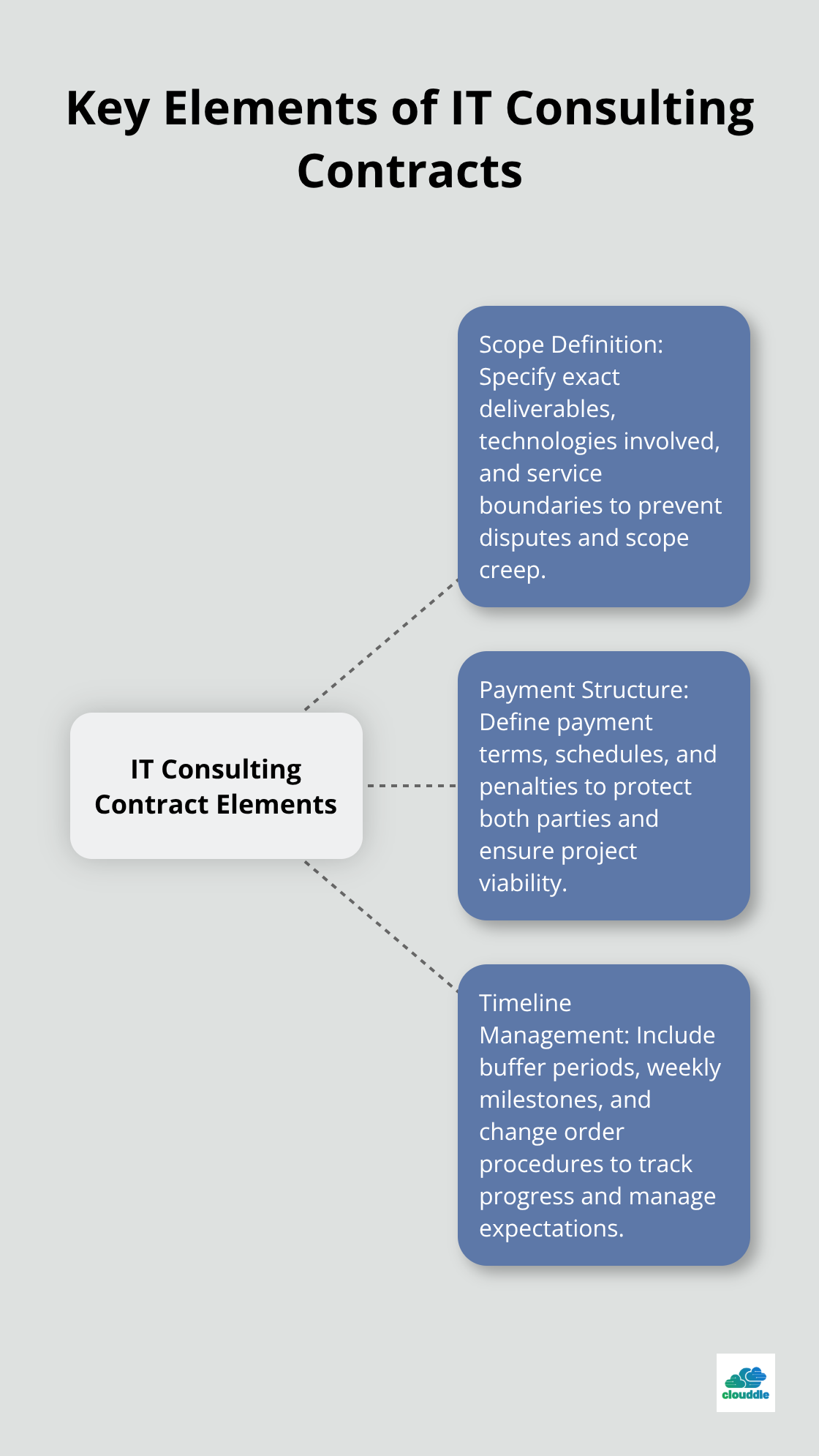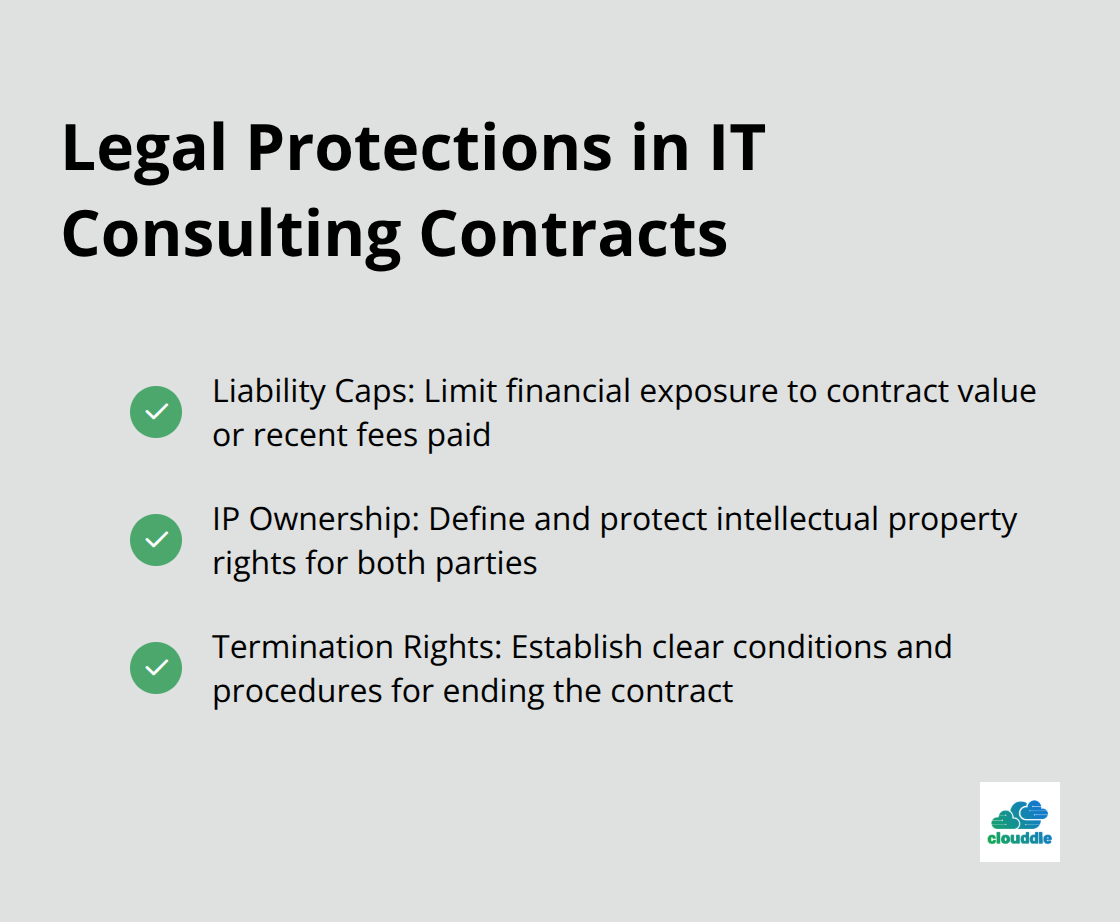IT consulting contracts templates form the backbone of successful client relationships and project outcomes. Without proper documentation, even the most skilled consultants face payment disputes, scope creep, and legal complications.
We at Clouddle have seen countless projects derail due to poorly structured agreements. A well-crafted contract template protects both parties while setting clear expectations from day one.
What Must Every IT Consulting Contract Include
A comprehensive IT consulting contract requires three non-negotiable elements that determine project success or failure.

The scope of work forms the contract’s foundation and must specify exact deliverables, technologies involved, and service boundaries.
Scope Definition That Prevents Disputes
Vague language like “general IT support” opens the door to endless scope creep. Detail specific tasks such as migrating 500 user accounts to Office 365, implementing two-factor authentication across all systems, or conducting quarterly security assessments. Include what falls outside the scope to prevent client assumptions about additional services. This precision protects both parties from misunderstandings that derail projects and damage relationships.
Payment Structure That Protects Both Parties
Payment terms directly impact cash flow and project viability. Net 30 payment schedules remain standard, though many consultants now demand net 15 to improve cash flow. Value-based pricing provides cost certainty that clients prefer, especially during economic pressure. Structure payments around milestones rather than time periods – 30% upfront, 40% at system deployment, and 30% upon final acceptance. Late payment penalties of 1.5% monthly encourage timely payments while covering your financing costs.
Timeline Management and Milestone Tracking
Project timelines must include buffer periods for unforeseen complications. Technology development projects frequently suffer from delays, making realistic scheduling essential. Break large projects into weekly milestones with specific deliverables and acceptance criteria. Define what constitutes project completion to avoid endless revision cycles. Include change order procedures that require written approval and additional fees for scope modifications.
These foundational elements work together, but they represent only the beginning of contract protection. Legal safeguards and risk management provisions add another layer of security that shields both consultants and clients from potential liabilities.
How Do You Protect Against Legal Risks

Liability Caps Save Consulting Businesses
Professional liability insurance covers only part of your risk exposure in IT consulting. Smart consultants cap their liability at the total contract value or fees paid within the past 12 months, whichever proves lower. Technology consulting firm Accenture limits liability to contract fees in most agreements, which protects smaller practices against catastrophic claims. Include gross negligence exceptions only – avoid broad liability terms that make you responsible for client system failures beyond your control. Force majeure clauses protect you from liability during uncontrollable events like natural disasters or cyberattacks that prevent service delivery.
IP Ownership Determines Future Revenue
Most clients demand work-for-hire clauses that transfer all intellectual property rights to them immediately upon creation. Push back on this standard practice. Retain ownership of methodologies, frameworks, and tools you developed before the engagement. License specific deliverables to clients while you keep underlying systems proprietary. This approach lets you reuse valuable IP across multiple projects and builds long-term business value. Document pre-existing IP in contract appendices to prevent disputes about ownership boundaries.
Termination Rights Prevent Bad Relationships
Termination-for-convenience clauses protect both parties from problematic engagements. Require 30 days written notice for termination and payment for all completed work plus expenses incurred. Include immediate termination rights if clients breach payment terms, violate confidentiality agreements, or engage in illegal activities that could damage your reputation. Indemnity clauses keep disputes private and cost-effective compared to public litigation (choose arbitration venues in your home state to avoid travel expenses). These protective measures create the foundation for successful consulting relationships, but proper contract customization takes your template from generic to powerful.
How Do You Customize Templates for Maximum Protection
Generic contract templates create significant challenges for professional services agreements, as demonstrated by business failures like GovWorks. One-size-fits-all approaches ignore the unique risks each service type presents. Cloud migration projects require different liability protections than cybersecurity assessments, which demand stricter confidentiality terms than general IT support contracts.
Service-Specific Template Variations
Network infrastructure projects need detailed acceptance tests and performance benchmarks that software consultation rarely requires. Security consultation demands background check requirements and clearance levels that database optimization projects never encounter. Managed service agreements require different termination procedures than project-based consultation because ongoing relationships create different exit complications.
Create separate template versions for each major service category rather than cram everything into one document. This targeted approach reduces negotiation time by 40% because clients see relevant terms instead of wade through irrelevant clauses.
Client Requirements Drive Template Success
Fortune 500 companies demand different contract structures than small businesses. Large enterprises typically require vendor insurance minimums of $2 million while startups often accept $500,000 coverage. Government contracts mandate specific compliance certifications that private sector clients ignore completely.
Healthcare organizations need HIPAA compliance language that manufacturing companies find unnecessary. Track which modifications clients request most frequently and build those options into your template library. This proactive customization prevents last-minute contract delays that kill deals.
Template Maintenance Prevents Legal Problems
Contract law changes annually and outdated templates create liability exposure that insurance policies might not cover. Review templates quarterly with legal counsel to incorporate new regulations and court decisions that affect IT consultation relationships.
Update payment terms when credit card processing fees change or new electronic payment methods emerge. Revise force majeure clauses after major events like pandemics reveal gaps in coverage (the COVID-19 pandemic exposed weaknesses in many standard force majeure provisions). Document all template changes with version numbers and implementation dates to track which contracts use current terms versus outdated provisions.
Final Thoughts
Well-structured IT consulting contract templates transform chaotic client relationships into profitable partnerships.

Legal review remains non-negotiable for contract templates because employment law changes quarterly and liability standards shift with new court decisions.
Professional legal guidance costs $2,000-5,000 upfront but prevents disputes that average $25,000 in resolution costs (insurance companies often require attorney-reviewed contracts for professional liability coverage). Implementation starts when you select your primary service categories and create targeted templates for each. Test templates with smaller clients first, then scale to enterprise accounts while you document every contract modification to build a library of proven clauses that speed future negotiations.
Contract management software automates renewal notifications and tracks template versions across active agreements. We at Clouddle understand that technology solutions require solid contractual foundations. Regular template audits prevent outdated terms from creating liability exposure while they keep agreements current with industry standards.


